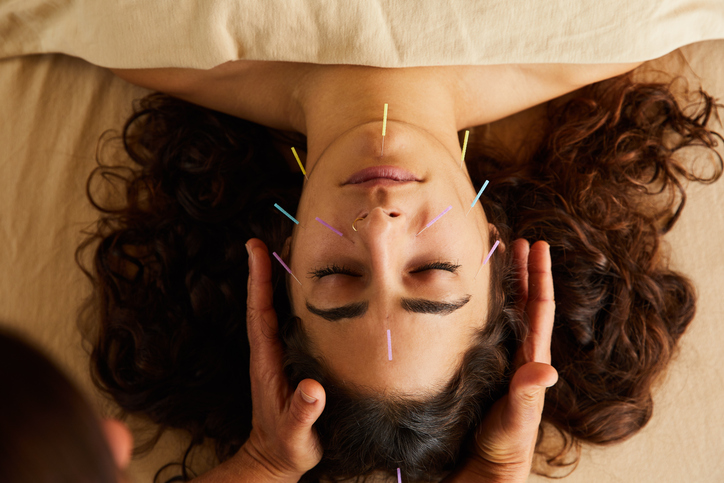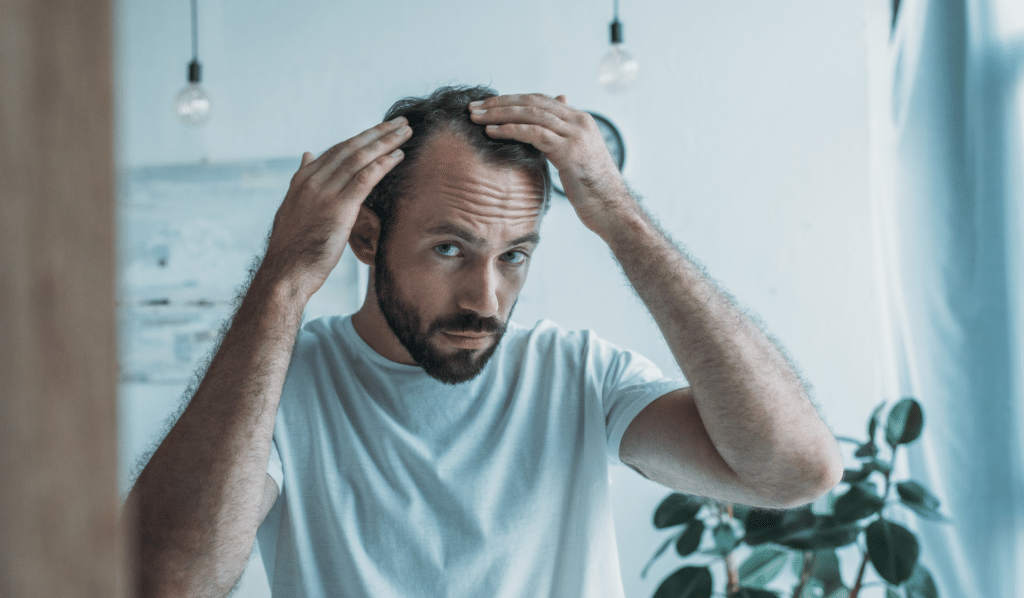Chinese Medicine for Hair loss
Hair loss is more than just a physical concern. It affects confidence, self-image, and emotional well-being. The frustration of seeing strands fall out daily can lead to stress, anxiety, and a constant search for solutions. While genetics and hormones play a role, Traditional Chinese Medicine views hair health as a reflection of the body’s internal balance.
For centuries, Chinese medicine has relied on herbs, acupuncture, and dietary therapy to support strong and healthy hair. This approach does not offer overnight miracles but instead works on a deeper level, revitalizing the body from the inside out. Understanding the root cause of hair loss allows for long-term, sustainable solutions that go beyond temporary fixes.
Chinese Medicine for Hair loss
Hair loss is more than just a physical concern. It affects confidence, self-image, and emotional well-being. The frustration of seeing strands fall out daily can lead to stress, anxiety, and a constant search for solutions. While genetics and hormones play a role, Traditional Chinese Medicine views hair health as a reflection of the body’s internal balance.
For centuries, Chinese medicine has relied on herbs, acupuncture, and dietary therapy to support strong and healthy hair. This approach does not offer overnight miracles but instead works on a deeper level, revitalizing the body from the inside out. Understanding the root cause of hair loss allows for long-term, sustainable solutions that go beyond temporary fixes.
Key Takeaways
-
Chinese medicine treats hair loss by addressing internal imbalances in the kidneys, liver, spleen, and blood circulation.
-
Herbs like He Shou Wu, Dang Gui, and Ginseng are commonly used in Traditional Chinese Medicine to nourish the scalp, improve blood flow, and support hair regrowth.
-
Acupuncture for hair loss stimulates scalp circulation, reduces inflammation, and supports hormonal balance to create optimal conditions for healthy hair.
-
Dietary therapy and stress management are essential components in Chinese medicine for restoring vitality and preventing further hair shedding.
Understanding Hair Loss in Traditional Chinese Medicine
In Traditional Chinese Medicine (TCM), hair health is deeply connected to the body’s overall vitality, particularly the strength of the kidney and liver systems. These organs play essential roles in maintaining internal balance, which in turn affects the quality, color, and growth of hair. The kidneys are believed to store jing (essence), a fundamental life force that governs growth and longevity. A deficiency in kidney essence can lead to premature hair thinning, graying, or even excessive shedding.
The liver, on the other hand, ensures the smooth circulation of blood throughout the body, delivering essential nutrients to the scalp and hair follicles. When liver function is compromised—whether due to emotional stress, poor lifestyle choices, or dietary imbalances—blood flow to the scalp can become restricted, leading to dull, weak, or brittle hair. In TCM, this is often referred to as Liver Blood Deficiency, a condition that can contribute to hair loss and delayed regrowth.
Beyond the kidneys and liver, TCM also considers other contributing factors such as excess heat in the body, which can dry out the scalp and cause inflammation, and yin or blood deficiencies, which may deprive the hair of vital nourishment. Additionally, an imbalanced digestive system—specifically a weakened spleen—can lead to poor absorption of nutrients, further exacerbating hair thinning.
Rather than viewing hair loss as an isolated issue, TCM takes a holistic approach by addressing underlying imbalances that affect the body as a whole. Through dietary adjustments, herbal therapy, acupuncture, and stress management techniques, TCM aims to restore harmony, improve circulation, and strengthen the body’s internal foundation, creating the ideal conditions for healthy hair growth.
Chinese Herbs for Hair Growth and Scalp Health
He Shou Wu (Fo-Ti)
This well-known herb has been used for centuries to prevent premature graying and promote thick, healthy hair. It nourishes the liver and kidneys, replenishing the body’s energy and supporting long-term hair growth.
Dang Gui (Angelica Sinensis)
Often referred to as the female ginseng, Dang Gui enhances blood circulation to the scalp. Rich in iron and essential nutrients, it supports hair follicle strength and prevents shedding.
Ginseng (Ren Shen)
Ginseng stimulates circulation, invigorating the scalp and awakening dormant hair follicles. It is an energizing herb that helps combat stress-related hair loss.
Nu Zhen Zi (Ligustrum Lucidum)
This powerful tonic herb strengthens kidney function and restores vitality to the hair. It is often used in formulas designed to prevent hair thinning and maintain dark, luscious strands.
Goji Berries (Gou Qi Zi)
Packed with antioxidants, goji berries nourish blood and improve scalp hydration. They support collagen production, keeping hair soft, strong, and resilient.
Bai Shao (White Peony Root)
This herb helps nourish the blood and supports liver function, which contributes to healthier hair. It also has anti-inflammatory properties that can help with scalp irritation.
Huang Jing (Polygonatum)
Huang Jing is often used to boost kidney and spleen function, both of which are crucial for maintaining strong and vibrant hair. It also helps combat fatigue and stress-related hair loss.
Zhi Mu (Anemarrhena Rhizome)
Known for its cooling properties, Zhi Mu helps balance excess heat in the body that may contribute to hair thinning and dryness. It is often used in herbal formulas to support scalp health and hydration.
Shou Wu Teng (Polygonum Multiflorum Vine)
This lesser-known herb works similarly to He Shou Wu but is particularly effective in calming the nervous system and improving sleep quality, which in turn helps with stress-related hair loss.
Cang Zhu (Atractylodes Rhizome)
Cang Zhu supports digestion and spleen function, helping to ensure proper absorption of nutrients essential for hair growth.
Acupuncture for Hair Loss
Acupuncture has been shown to promote hair regrowth by stimulating circulation and reducing inflammation in the scalp. Specific acupuncture points can activate blood flow, providing essential nutrients to hair follicles. Points such as Baihui (GV20) on the crown of the head, Sanyinjiao (SP6) on the lower leg, and Shenshu (BL23) on the lower back are often used to restore balance and improve hair health. Acupuncture also reduces stress and supports hormonal regulation, addressing internal imbalances that contribute to hair thinning.
Scalp Massage and Acupressure for Hair Growth
Regular scalp massage enhances circulation, bringing oxygen and nutrients to hair follicles. Applying gentle pressure to key acupressure points such as Touwei (ST8) near the hairline, Hegu (LI4) on the hand, and Fengchi (GB20) at the base of the skull can support hair regrowth. Using warm herbal oils infused with ginseng or sesame seeds can further nourish the scalp and strengthen the roots.
Dietary Therapy in Chinese Medicine for Hair Health
What you eat plays a crucial role in maintaining strong, healthy hair. Traditional Chinese Medicine emphasizes foods that build blood, nourish yin, and strengthen the kidneys.
Black Sesame Seeds
Rich in minerals and healthy fats, black sesame seeds are known for promoting dark, lustrous hair and preventing premature graying.
Walnuts
Packed with omega-3 fatty acids, walnuts improve scalp hydration and stimulate hair growth.
Seaweed
High in iodine and essential minerals, seaweed supports thyroid health, which plays a vital role in hair growth.
Bone Broth
A natural source of collagen and amino acids, bone broth nourishes the scalp, strengthens hair strands, and prevents brittleness.
Dark Leafy Greens
Spinach, kale, and bok choy provide iron and antioxidants, ensuring a healthy blood supply to the scalp.
Avoiding excessive processed foods, alcohol, and dairy can help reduce inflammation and prevent dampness in the body, which is believed to contribute to hair loss.
Herbal Teas and Tonics for Hair Health
Drinking herbal teas can provide internal nourishment for stronger, healthier hair.
He Shou Wu Tea
Steeping He Shou Wu in hot water releases its nourishing properties, supporting long-term hair vitality.
Goji Berry and Chrysanthemum Tea
This combination boosts blood circulation and soothes stress-related tension, promoting overall scalp health.
Ginseng Tea
Ginseng provides an energy boost, revitalizing hair follicles and encouraging regrowth.
Managing Stress for Hair Health
Emotional stress disrupts the flow of Qi and blood, leading to hair loss. Traditional Chinese Medicine recommends mindful practices to calm the nervous system and restore balance.
Qigong and Tai Chi
These gentle movement practices support circulation and reduce stress hormones that can contribute to hair thinning.
Breathwork and Meditation
Deep breathing exercises improve oxygenation and encourage relaxation, supporting healthy hair growth.
Herbs for Stress Relief
Suan Zao Ren (Ziziphus) is often used to calm the mind and prevent stress-induced hair shedding.
Topical Treatments in Chinese Medicine for Hair Loss
Applying natural ingredients to the scalp can provide direct nourishment to hair follicles.
He Shou Wu Infused Oil
A powerful scalp treatment that restores strength and vitality to thinning hair.
Rice Water Rinse
A traditional remedy that strengthens hair strands, improves shine, and enhances elasticity.
Herbal Hair Masks
A paste made from ginseng, angelica root, and black sesame oil can deeply condition the scalp and encourage regrowth.
Combining Traditional Chinese Medicine with Modern Approaches
Many people combine Chinese medicine with modern dermatology treatments to achieve optimal results. Using Chinese herbal supplements alongside topical hair loss treatments can enhance effectiveness. Working with a TCM practitioner ensures a tailored approach that addresses the root cause of hair loss while supporting long-term scalp health.
When to See a Traditional Chinese Medicine Practitioner
If hair loss is persistent, severe, or accompanied by other symptoms such as fatigue, digestive issues, or hormonal imbalances, consulting a TCM practitioner is recommended. A professional assessment can identify underlying imbalances and create a personalized treatment plan that includes acupuncture, herbal formulas, and dietary guidance.
A Holistic Approach to Healthy Hair
Chinese medicine offers a holistic approach to hair loss by addressing the root cause rather than just the symptoms. At ACA Acupuncture and Wellness, our practitioners focus on restoring internal balance through acupuncture, herbal medicine, dietary therapy, and stress management. By improving circulation, nourishing the scalp, and supporting the body’s natural healing processes, we create the optimal conditions for stronger, healthier hair.
Consistency is key—hair regrowth is a gradual process that requires patience and the right approach. Whether you’re experiencing thinning, excessive shedding, or premature graying, our team at ACA Acupuncture and Wellness can tailor a treatment plan that aligns with your unique needs, helping you achieve long-term results while enhancing your overall
Sources:
Liang, Y., Yuan, J., Shazada, N. E., Jiang, J., & Wu, J. (2022). Traditional Chinese Medicine treatment for androgenetic alopecia based on animal experiments: A systematic review and meta-analysis. Frontiers in Pharmacology, 13, Article 9578824.
Dou, J., Zhang, Z., Xu, X., & Zhang, X. (2022). Exploring the effects of Chinese herbal ingredients on the signaling pathway of alopecia and the screening of effective Chinese herbal compounds. Journal of Ethnopharmacology, 296, Article 115463.
Li, A. R., Andrews, L., Hilts, A., & Valdebran, M. (2022). Efficacy of acupuncture and moxibustion in alopecia: A narrative review. Frontiers in Medicine, 9, Article 9219404.
Frequently Asked Questions
How does stress contribute to hair loss in TCM?
According to TCM, stress leads to Liver Qi Stagnation, which can disrupt blood flow to the scalp. When the Liver is imbalanced, it cannot properly nourish the hair follicles, leading to excessive shedding or slowed hair growth. TCM recommends meditation, Qi Gong, Tai Chi, and herbal adaptogens to manage stress and prevent hair loss.
How long does it take to see results with TCM for hair loss?
TCM is a holistic and gradual approach. Most people start noticing improvements in hair texture, strength, and reduced shedding within three to six months. Consistency with herbal remedies, acupuncture, and dietary changes is key to achieving long-term results.
Are there any TCM treatments for premature graying?
Yes, He Shou Wu (Fo-Ti) is one of the most effective herbs used to restore hair color and delay premature graying. It nourishes the Kidney Essence and Liver Blood, which are responsible for maintaining natural hair pigmentation. Other supportive foods include black sesame seeds and goji berries.
Can Chinese medicine be combined with modern hair loss treatments?
Yes, TCM can complement modern dermatological treatments, including topical minoxidil, hair transplants, and low-level laser therapy. However, it is essential to consult with both a TCM practitioner and a dermatologist to create a personalized treatment plan.
Can TCM reverse baldness?
TCM can help slow down hair loss and stimulate new growth but may not fully reverse baldness with complete follicle loss. The best results are seen in cases where hair follicles are still active. Combining TCM with modern treatments like microneedling and PRP (Platelet-Rich Plasma) therapy can improve results.
Can poor digestion contribute to hair loss in TCM?
Yes. The Spleen and Stomach play a crucial role in nutrient absorption. If digestion is weak, the body cannot efficiently extract nutrients needed for strong hair. Signs of Spleen Qi Deficiency include bloating, fatigue, and poor circulation, which can lead to brittle hair and slow growth. Strengthening digestion with herbs like Atractylodes (Bai Zhu) and Poria (Fu Ling) can improve hair health.
Contact ACA Acupuncture & Wellness
Get in Touch
Newsletter Sign Up
LOCATIONS
MANHATTAN
QUEENS
NEW JERSEY
CALIFORNIA

ACA Franchise Opportunities
The over $4 billion US acupuncture market offers a great opportunity with over 10% annual growth rates and a continuing flow of new patients interested in the benefits of acupuncture.







